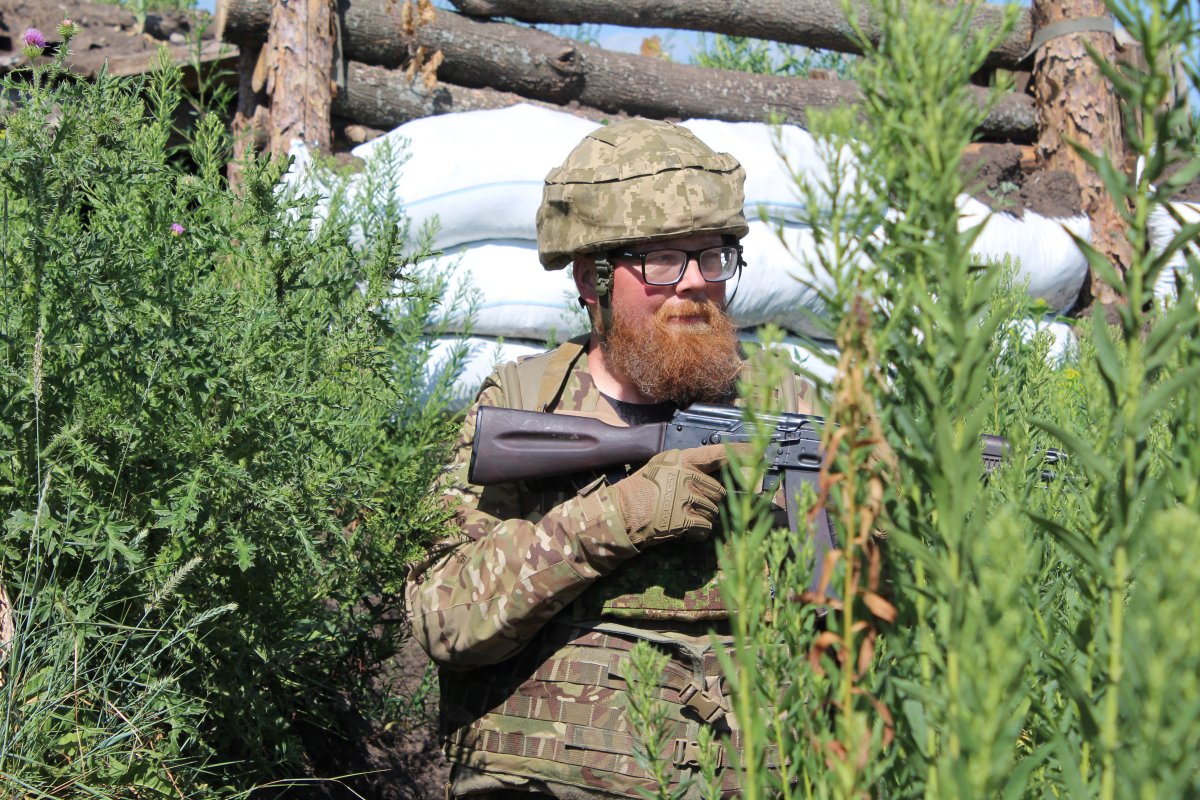KHARKIV, Ukraine — Wearing a military uniform marked with with both the Ukrainian and Canadian flags, Matthew McGill pleaded for more support to fight Russia’s invasion.

“We need equipment,” the Canadian Armed Forces veteran and member of Ukraine’s international legion said on Thursday. “The legion needs money to buy equipment.”
“Any way you can help us continue our fight is appreciated.”
A 49-year-old Calgary resident, McGill serves in a signals platoon of the Ukrainian military on the Kharkiv front, where there have been heavy missile and artillery attacks.
“A lot of artillery,” McGill said. “Everybody reacts differently. For myself, I just kind of listen more closely to figure out if it’s incoming or outgoing and how close it is. And if it’s too close you get in a trench.”
Russian and Ukrainian forces have been clashing in a handful of villages outside Kharkiv city. Russia wants to push the Ukrainian army away from its border and protect supply lines supporting its attempt to seize the eastern Luhansk and Donetsk regions.
Those battling the Russians in the region include members of the International Legion of Territorial Defence of Ukraine, and at least one is Canadian.
Speaking to reporters at the edge of a farm field far from the closest Russian position, he said he was driving fuel trucks on ice roads in the Northwest Territories when Russia invaded Ukraine on Feb. 24.
President Volodymyr Zelenskyy soon invited foreign volunteers to join an international legion that would operate as part of Ukraine’s military.
A veteran of the Canadian Forces 735 Communication Regiment, McGill said he thought he had something to offer.
“I felt there was more I could do than just post on Facebook that I support Ukraine and maybe give some money,” he said. “I have skills that I thought would be useful here.”
His family didn’t want him to go. He is the father of two sons, and recently became a grandfather.
While his family understood why he wanted to help Ukraine, they were worried, but in the end they were supportive, he said.
He found the application form online and underwent screening. Almost two weeks later, he learned he was approved and flew to Poland.
“My employer was very supportive and I will have a job waiting for me when I get back,” he said.
Volunteers met him at Warsaw airport and he crossed the border in March for a month of training. He said that while the international legion may have been disorganized in the early days, it has improved.
“I would say right now things are really good,” he said.
According to the international legion, “a lot” of Canadians have joined the fight against Russia, although it won’t provide numbers. Many but not all are Ukrainian-Canadians.
“There’s quite a few Canadians here,” agreed McGill, who does not have any Ukrainian roots.
One is a drone operator who helps target Russian positions, he said. McGill said he has also come across equipment provided by Canadians, such as night-vision goggles and ready-to-eat meals.
Canada has provided M777 artillery guns, rifles, ammunition and other military support but Ukraine remains outgunned by Russia and has been asking for more weapons.
Following Russia’s missile attack on a crowded shopping mall in Kremenchuk on Monday, Zelensky asked a NATO summit in Madrid for “much more modern systems, modern artillery.”
McGill said he’d one close call with a Russian missile. He was in a building used as an observation point and was about to step outside when a missile hit and his glasses were blown off his face.
“Thankfully nobody was hurt, but just coming that close really opens your eyes,” he said. “Being hit by missiles and artillery close is something that will change everybody.”
Explosions aren’t the only risks. Two British members of the Ukrainian forces captured by Russia were sentenced to death earlier this month. Two Americans are also now in Russian custody.
The Russian government calls foreigners fighting for Ukraine mercenaries who are not entitled to the prisoner of war protections of the Geneva Conventions.
McGill said he would stay in Ukraine for another two months and would return to Canada at the end of August.
“I think six months is enough for me to be away from my family,” he said.
He said his experiences had reinforced his views about the need to defend Ukraine from Russian territorial expansionism.
“Just seeing how horrible the Russians are in their treatment of the Ukrainian civilians has made me feel more strongly about the need for me to be here,” he said.
“Just be grateful that we don’t have war in Canada.”
Stewart.Bell@globalnews.ca







Comments